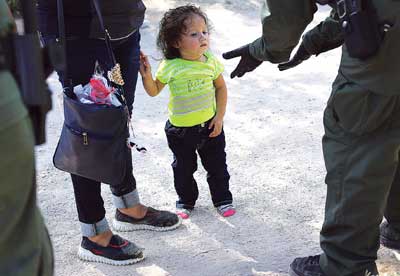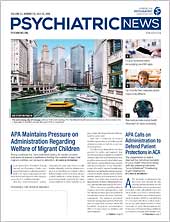In an about-face, President Trump signed an Executive Order last month halting his administration’s policy of separating migrant children from their parents who illegally cross the U.S. southern border.
But his “zero-tolerance” policy continues for migrants who cross the border illegally, and the administration is scrambling to comply with a federal judge’s order to reunify all separated children within 30 days. The government had returned 522 separated children to their families as of press time, the Department of Homeland Security said.
APA led a coalition of mental health organizations in lobbying the administration to halt its cruel separation policy.
“Children are dependent on their parents for safety and support. Any forced separation is highly stressful for children and can cause lifelong trauma, as well as an increased risk of other mental illnesses, such as depression, anxiety, and posttraumatic stress disorder,” wrote APA and 17 mental health organizations, including the American Association of Child & Adolescent Psychiatry and the American Psychoanalytic Association, in a letter last month to the departments of Justice, Homeland Security, and Health and Human Services.
“This is not an acceptable policy to counter unlawful immigration, and the administration must immediately rescind this course of action,” the letter continued. “We support practical, humane immigration policies that take into account what we know about the harmful, long-term psychological effects of separation on children and their families.”
“Many families crossing the United States border are fleeing war and violence in their home countries and are already coping with the effects of stress and trauma,” APA President Altha Stewart, M.D., said in a statement opposing the separations.
Images of young children confined in steel cages and sleeping en masse on thin pads on concrete floors with aluminum-foil-like blankets sparked condemnation around the world, including from Pope Francis and the four living former first ladies. Now the administration is seeking to replace a bad policy with one just as questionable as it seeks to overturn a ruling prohibiting children from being kept in detention for longer than 20 days. So instead of separating children from their parents who are sent to detention facilities, the children may be heading to long-term detention with them.
The government, under a federal court order known as the Flores settlement, is prohibited from keeping migrant children in detention for more than 20 days. But Trump’s Executive Order instructs Attorney General Jeff Sessions to file a request to modify Flores so it can detain children and parents longer term while adjudicating the criminal proceedings of the parents for improper entry. When combined with asylum claim evaluations, such proceedings can take months or years to resolve.
“Conditions in U.S. detention facilities, which include forcing children to sleep on cement floors, open toilets, constant light exposure, insufficient food and water, no bathing facilities, and extremely cold temperatures, are traumatizing for children,” wrote Colleen Kraft, M.D., M.B.A., president of the American Academy of Pediatrics in a statement. “No child should ever have to endure these conditions.” Children in such facilities face abuse and have been forced to share quarters with unrelated adults.
“The core issue of trauma is when the ability to trust in the people around you has been taken away,” said Kimberly Gordon, M.D., vice chair of APA’s Council on Children, Adolescents, and Their Families; president of APA’s Caucus of Black Psychiatrists; and medical director of Hope Health Systems Inc. “The majority of these children—who likely speak only limited English—don’t know where their parents are and are unable to communicate even their most basic needs to those around them.”
Gordon said she hopes the child-separation crisis is an eye opener: “We as Americans need to do something about racism. The United States has a long history of forced displacements of children from their parents among minority and underrepresented groups.”
Such separations started with Native Americans who were taken from their families in the 1860s and placed into government-run boarding homes to be Christianized, followed by enslaved African children. Separations now continue with the mass incarceration of blacks, both juveniles and adults, for minor offenses, Gordon said. “I don’t think the experience would be the same if these [migrant] children were not from a racialized group. They wouldn’t put white children in a cage,” she said.
Gordon said that the separations ordered by the administration are likely creating the kind of psychopathy that it says it is seeking to avoid. “Not for all children, but extensive trauma, such as separating young children from their parents, can lead to attachment problems,” she said. “Children need to have secure bases and need to be with parents and loving caregivers.”
APA is calling on its members to keep up the pressure on the administration to prevent further trauma from being inflicted on these children and families. APA has posted a form in its online Action Center that psychiatrists can use to urge the administration to halt its destructive immigration policies immediately. ■
The Action Center form can be accessed
here. APA’s letter to the administration is available
here. Stewart’s statement is located
here.

